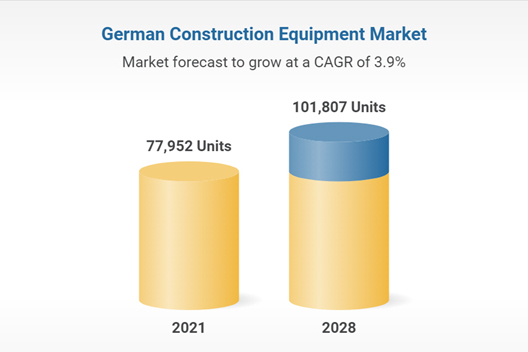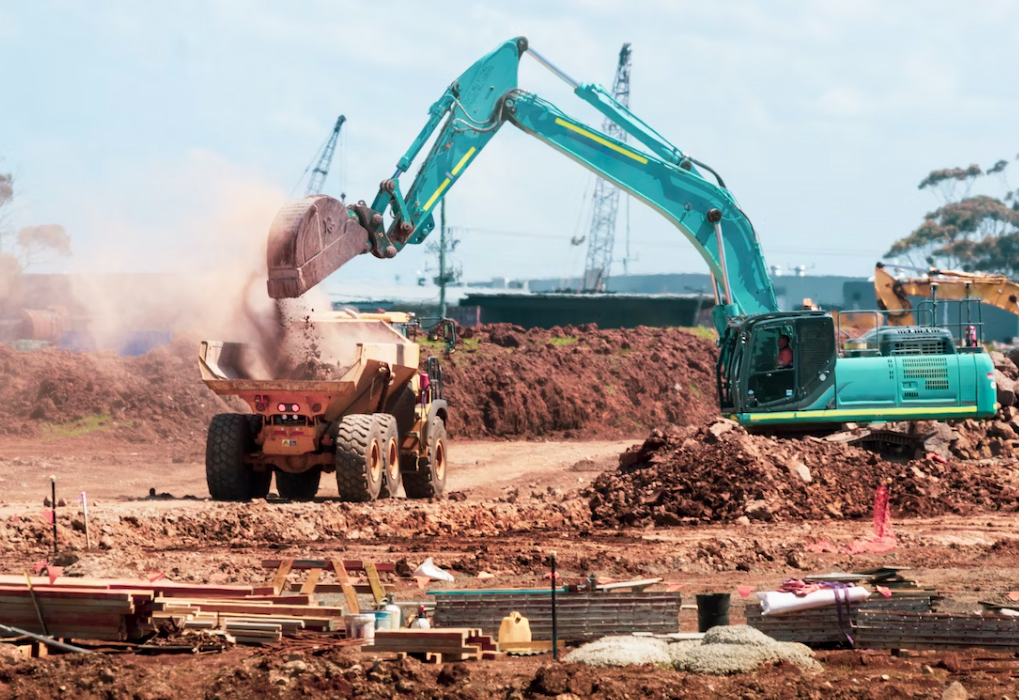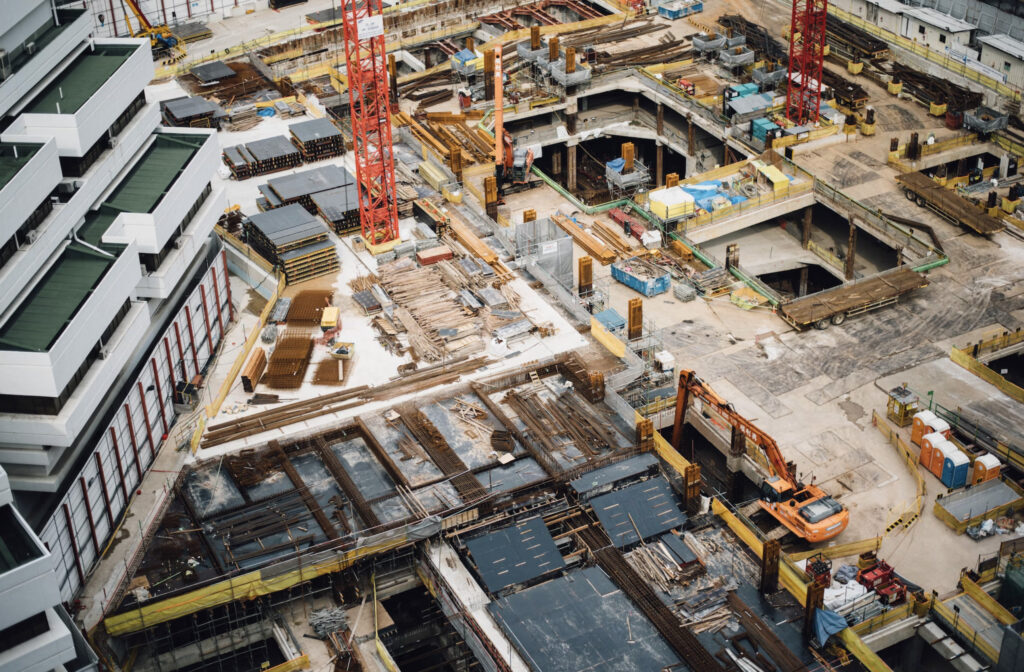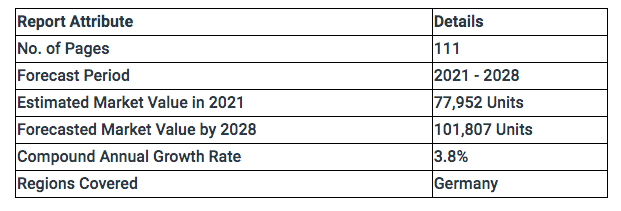The Germany construction equipment market share by units is expected to reach 101,807 units by 2028, growing at a CAGR of 4.02%. The Germany construction equipment market is expected to grow at a CAGR of 3.89% during 2022-2028.

Rising government investment in public infrastructure projects & ‘Green Infrastructure Strategy’ is expected to prompt construction equipment sales in Germany during the forecast period (2022-2028).
The country’s new government under the ‘Federal Ministry for Housing, Urban Development and Building in 2022 has aimed to expand housing construction. It has planned to build 400,000 apartments every year. Under the Housebuilding subsector, investments grew by 39% in 2021, where the number of new flats and houses coming to the market doubled to more than 300,000 units. Such initiatives by the government give a significant boost to the Germany construction equipment market.
KEY HIGHLIGHTS
- In Germany construction equipment market, the earthmoving construction equipment segment accounted for the largest market share in 2021. In the Material Handling Segment, forklifts accounted for the largest share in 2021.
- Forklifts are compact equipment used for material handling in confined spaces such as small warehouses, & distribution centers. Germany is one of the most attractive logistics markets in the world due to its central location in Europe. It brings over USD 269.51 billion to the country’s budget. German developer Goldbeck International is expected to complete the Flow Warehouse in Duisburg-Walsum for Maersk in 2023. The development of warehouses in Germany is expected to drive the demand for forklifts and telehandlers in the Germany construction equipment market.
- The project Digital Rail Germany, introduced in January 2020, aims to increase the performance of Germany’s Rail Network by as much as 35%. In 2021, the German government announced a USD 324 billion national investment to improve roads, rails, and waterways over the next 10-15 years.
- According to the Global FDI Annual Report 2022, in 2021, Germany surpassed the United States in terms of the number of projects (approximately 1,537) receiving Foreign Direct Investment (FDI).
- Increasing building materials and rising labor costs are some major challenges in the Germany construction equipment market that can adversely affect the demand for construction equipment. Under the Germany Recovery & Resilience Plan, the European Union granted aid of USD 25.54 billion.

MARKET TRENDS AND DRIVERS
Investment in Public Transport: Rails, Roads & Bridges
- The Germany Rail (Deutsche Bahn) and the federal government have targeted to spend USD 13.56 billion in 2022, which is a 6.3% increase compared to 2021. This investment by the government majorly focuses on renewing and modernizing Germany’s rail infrastructure. The country has planned to mend bridges on much of the country’s Autobahn network. A budget of USD 529.17 million has been set by the German Government’s Road firm, Autobahn, in 2022.
- In addition, the German government allotted USD 372.42 million for road construction projects in 2022 in the Brandenburg region which is approximately USD 5 million higher than in 2021, which will significantly contribute to the Germany construction equipment market growth.

High Demand for Excavators Due to Mining, Construction, and Smart City Projects
- Regardless of the Covid-19 impact, investment opportunities in the construction industry have attracted foreign investors who have aided the construction equipment market in 2021. The government’s aid in the residential projects, rise in infrastructure construction, increase in FDI and surge in the rental investment of construction equipment is expected to lead the Germany construction equipment market
- The growing demand for excavators is attributable to the improvements in the mining and construction sectors and a few government projects like the smart city project. The smart city project is supported by the government’s investment of USD 751.42 million. The mining industry consumes a large part of the excavator industry in Germany. Hard coal and lignite make up most of the mineral resources extracted in the country.
Investment in Green Infrastructure Strategy
- The country has targeted investing USD 220 billion by 2026 to support the industrial transformation, including climate protection, hydrogen technology, and electric vehicle charging station expansion. The construction machinery and building experienced a 22% increase from the previous year (2020) due to the infrastructure push with highways, dams, and green cities, which require tons of heavy machinery; such activities are contributing to the Germany construction equipment market.
- Germany and Indonesia have contracted to work on this Green Infrastructure Project, where approximately USD 2.7 billion worth of loan amount will be made accessible for the infrastructure related to climate and the environment. Some notable projects scheduled under this are Green Infrastructure at Leipzig, MoorFutures in Mecklenburg, and Urban GreenUP.
Adoption of Building Information Modeling (BIM) to Enhance Remote Monitoring & Digitization
- The German government has invested more than USD 4.94 million in Building Information Modeling (BIM) for public projects, mandating using digital technology to design and construct all projects. The Federal Ministry of Transport and Digital Infrastructure (BMVI) will aid medium and small-sized companies in integrating BIM to increase the productivity of construction processes and improve the quality of buildings constructed.
- A few companies like Caterpillar, Volvo, and JCB are at the forefront of integrating BIM in the Germany construction equipment market. The investment by the government for the integration of BIM into construction machines is expected to trigger the demand for the BIM-integrated construction equipment industry.
MARKET RESTRAINTS
Russia-Ukraine War Impacting the German Construction Projects Due to the Supply Chain Bottleneck Impacting the Development of Construction Projects
- In 2020, Germany imported approximately 66.1% of its natural gas from Russia, highlighting its massive dependency on Russia for fossil fuels. According to the Federal Statistical Office, in March 2022, Germany had reduced the volume of its import of fossil fuel from Russia by 27.8%, leading to inflation which cost fossil fuel imports 131.7% more compared to 2021.
- In addition to the surge in energy prices, raw materials and fuel prices also increased. Diesel fuel climbed by 57.5%, steel went up by 74.4 %, and aluminum increased by 37% over 7-8 months after the war hit, causing delivery problems for construction companies. HBD survey pointed out that approximately 40% of the clients put the projects on hold, and 30% of the customers canceled the projects after seeing the delayed deliveries caused by the disruption in the supply chain, directly affecting the Germany construction equipment market.
VENDOR LANDSCAPE
- Caterpillar has the strongest share in the German construction equipment market. Caterpillar, Volvo, Komatsu & Liebherr are the market leaders in the German industry, has a strong distribution network & provide a wide variety of products.
- Hitachi Construction Machinery & XCMG are emerging strong in the German market. These companies are introducing innovative products to capture the Germany construction equipment market share. For instance, in 2022, XCMG launched a new electric all-terrain crane, excavator, and loader at the Bauma festival in Germany.
- Hitachi Construction Machinery launched a wheeled excavator ZX135W-7 in the German construction equipment market, comprising a 360-degree swing radius, 2.2m arm length, and a Stage V-compliant 4-cylinder engine in Germany.
Key Metrics

Source: Research and Markets


 Copyright 2017-2025 All rights reserved.
Copyright 2017-2025 All rights reserved.